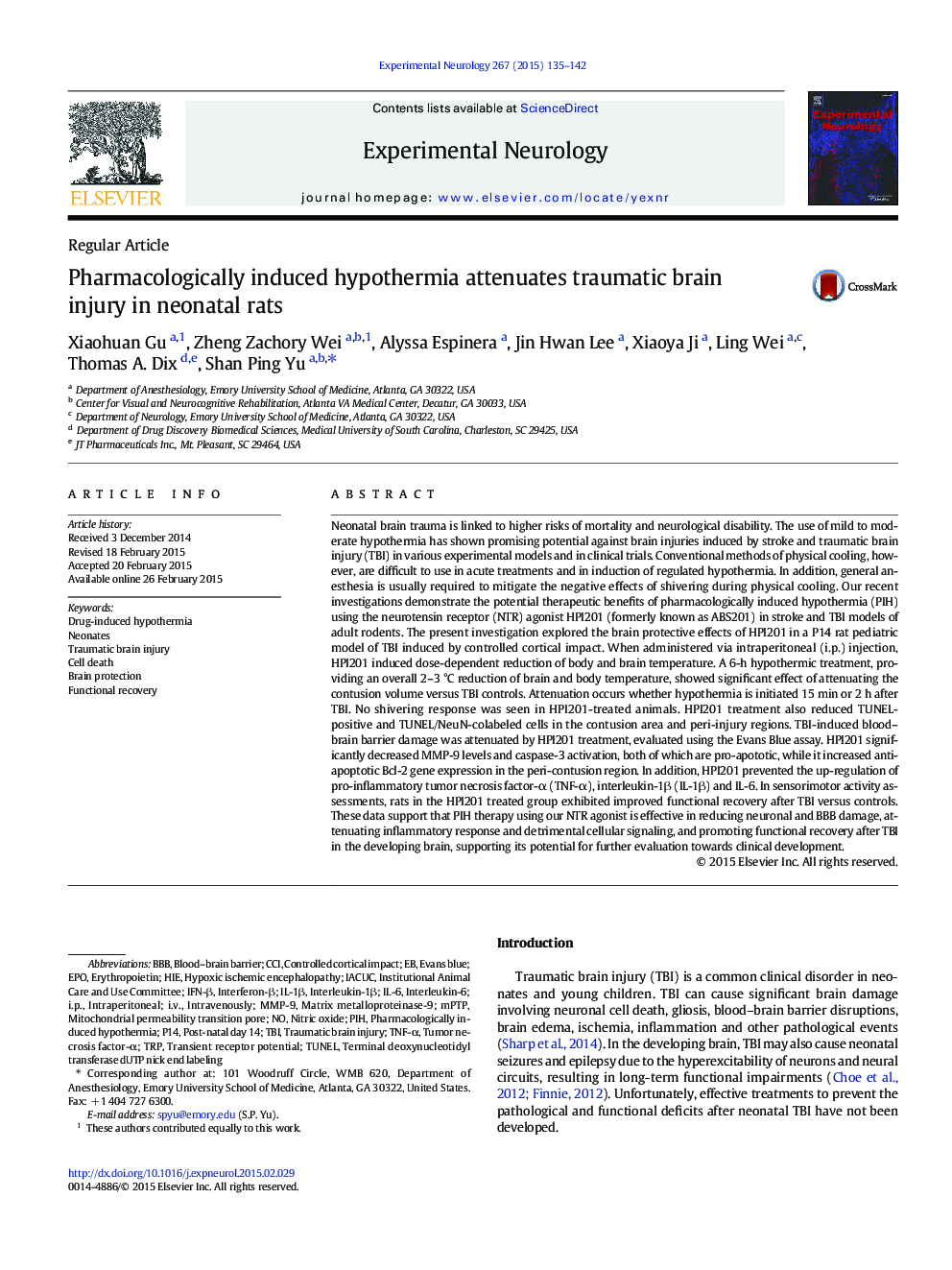| کد مقاله | کد نشریه | سال انتشار | مقاله انگلیسی | نسخه تمام متن |
|---|---|---|---|---|
| 6017792 | 1580166 | 2015 | 8 صفحه PDF | دانلود رایگان |
عنوان انگلیسی مقاله ISI
Pharmacologically induced hypothermia attenuates traumatic brain injury in neonatal rats
ترجمه فارسی عنوان
هیپوترمی ناشی از فارماکولوژی آسیب مغزی آسیب دیده در موش های نوزاد را کاهش می دهد
دانلود مقاله + سفارش ترجمه
دانلود مقاله ISI انگلیسی
رایگان برای ایرانیان
کلمات کلیدی
IACUCPIHHIEi.v.CCIMPTPIL-1βi.p.IFN-βMMP-9EPOP14IL-6Hypoxic ischemic encephalopathy - آنسفالوپاتی ایسکمی هیپوکسیerythropoietin - اریتروپویتینmitochondrial permeability transition pore - انتقال نفوذی میتوکندری منفی استInterferon-β - اینترفرون-βinterleukin-6 - اینترلوکین ۶Interleukin-1β - اینترلوکین-1βEvans Blue - ایوانز آبیintraperitoneal - داخل صفاقیintravenously - داخل وریدیInstitutional Animal Care and Use Committee - سازمان مراقبت و مراقبت از حیواناتBlood–brain barrier - سد خونی مغزیBBB - سد خونی مغزیMatrix metalloproteinase-9 - ماتریکس متالوپروتئیناز -9Nitric oxide - نیتریک اکسیدcontrolled cortical impact - کنترل قشر مغزی
موضوعات مرتبط
علوم زیستی و بیوفناوری
علم عصب شناسی
عصب شناسی
چکیده انگلیسی
Neonatal brain trauma is linked to higher risks of mortality and neurological disability. The use of mild to moderate hypothermia has shown promising potential against brain injuries induced by stroke and traumatic brain injury (TBI) in various experimental models and in clinical trials. Conventional methods of physical cooling, however, are difficult to use in acute treatments and in induction of regulated hypothermia. In addition, general anesthesia is usually required to mitigate the negative effects of shivering during physical cooling. Our recent investigations demonstrate the potential therapeutic benefits of pharmacologically induced hypothermia (PIH) using the neurotensin receptor (NTR) agonist HPI201 (formerly known as ABS201) in stroke and TBI models of adult rodents. The present investigation explored the brain protective effects of HPI201 in a P14 rat pediatric model of TBI induced by controlled cortical impact. When administered via intraperitoneal (i.p.) injection, HPI201 induced dose-dependent reduction of body and brain temperature. A 6-h hypothermic treatment, providing an overall 2-3 °C reduction of brain and body temperature, showed significant effect of attenuating the contusion volume versus TBI controls. Attenuation occurs whether hypothermia is initiated 15 min or 2 h after TBI. No shivering response was seen in HPI201-treated animals. HPI201 treatment also reduced TUNEL-positive and TUNEL/NeuN-colabeled cells in the contusion area and peri-injury regions. TBI-induced blood-brain barrier damage was attenuated by HPI201 treatment, evaluated using the Evans Blue assay. HPI201 significantly decreased MMP-9 levels and caspase-3 activation, both of which are pro-apototic, while it increased anti-apoptotic Bcl-2 gene expression in the peri-contusion region. In addition, HPI201 prevented the up-regulation of pro-inflammatory tumor necrosis factor-α (TNF-α), interleukin-1β (IL-1β) and IL-6. In sensorimotor activity assessments, rats in the HPI201 treated group exhibited improved functional recovery after TBI versus controls. These data support that PIH therapy using our NTR agonist is effective in reducing neuronal and BBB damage, attenuating inflammatory response and detrimental cellular signaling, and promoting functional recovery after TBI in the developing brain, supporting its potential for further evaluation towards clinical development.
ناشر
Database: Elsevier - ScienceDirect (ساینس دایرکت)
Journal: Experimental Neurology - Volume 267, May 2015, Pages 135-142
Journal: Experimental Neurology - Volume 267, May 2015, Pages 135-142
نویسندگان
Xiaohuan Gu, Zheng Zachory Wei, Alyssa Espinera, Jin Hwan Lee, Xiaoya Ji, Ling Wei, Thomas A. Dix, Shan Ping Yu,
